This is an ongoing rewatch thread with multiple contributing members. You're always welcome to hop aboard, even as a first-time viewer!

So a buddy of mine just started this 1990s cult classic for the first time. I figured it's been a while so I'd join him. And why not go full-GAF about it in the process? I figure it's a nice venue for posting thoughts as I rewatch the series, and maybe I can hook one or two new fans, or rekindle a love for the show with an old one.
What the heck is Babylon 5?
Well, firstly, let's take a look at what Wikipedia has to say.

A "novel for television" approach? In the 1990s?
Yep. Y'all have heard of Twin Peaks, right? Stupid question, it's 2017, the revival's on the air, of course you have. Babylon 5 was kind of the original Twin Peaks of space opera TV. Early on, the episodic-versus-serialized ratio is slimmer -- think X-Files standalone-versus-mythology, I guess -- but as the seasons roll by, that ratio tilts in favor of the ongoing plotlines. Of which there are several. The worldbuilding is superb, and multiple plot arcs come to a head, especially in the fourth season when original network PTEN was close to folding and JMS realized he needed to wrap things up fast. For my money, both as a wide-eyed child and a more seasoned adult, he does so with aplomb. (TNT then picked up the series for a fifth season, multiple TV movies, and an ultimately-botched spinoff called Crusade, making Season "5.0" pretty rough and episodic again before moving toward a great back half and a series finale so good AVClub wonders if it's the best in television.) Obviously, don't actually read that article if you want to remain unspoiled.

What's the pitch, in a nutshell?
Earth's still a relative newcomer to the intergalactic scene. We had ourselves a bit of a war with the Minbari, who very nearly wiped us out of existence but pulled back from the assault at the last minute for reasons unknown. In recent years, we've tried our luck at "the Babylon Project" -- a space station that'll act as neutral ground for humanity and several prominent alien races to talk things through and avoid further bloodshed. It... hasn't gone well. The first three Babylon stations were all sabotaged and destroyed. The fourth one seemingly blinked out of existence -- no one knows what the heck happened. As you might imagine, we begin our story toward the beginning days of the fifth.
At first, the show seems content to tell the story as I've just told you. But archaeological discoveries, rising tensions between races, mysterious benefactors, conspiracies back home on Earth, and characters pushed to the brink, will all come together to illustrate that the universe is much bigger than we think it is, and events are being orchestrated to throw us all into the fire.
What are the best aspects of this show?
Man, the worldbuilding is terrific. JMS tapped into certain Tolkien concepts, and it shows, but he does it with all his own flourishes and several distinctive alien races, a few of which are better-developed than most of what we see in the Star Trek franchise. (I'm a Niner 'til I drop and I <3 Cardassians and Bajorans, but seriously, the Minbari and the Centauri and the Narn on B5 are all good stuff.) The setting rocks, too. The titular station is well-realized, with neat this-isn't-quite-as-advanced-as-Trek beats like rollercoaster-looking harnesses while riding a commuter tram, and a rough-and-tumbling alien-outcasts sector reminiscent of Star Wars: Knights of the Old Republic's Taris Underdark. Best of all, though, is the successfully-told story. The narrative has some neat twists and turns along the way, including some very Mass Effect 1 moments. There's also the matter of the two alien ambassadors named Londo Mollari and G'Kar; their personal arcs are some of the best I've seen in any entertainment medium, but I'll say no more. Best to see it for yourself.
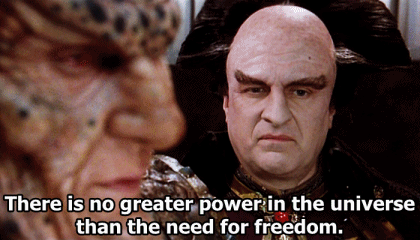
You're hyping it to hell. Is it truly perfect television?
Heavens, no. It's rough around the edges, I'm not gonna lie. It isn't my favorite show, although it's up there. The pilot TV movie and much of the first season can be a trying experience, with cheesy moments galore and some very questionable acting. Even in the second and third seasons, this doesn't entirely go away, although it gets better every year. Don't get too attached to the early cast, because several of the characters in the TV movie aren't even in the show, which premiered almost a year later. And as I've previously mentioned, the first half of Season 5 is a real step down, too, but thankfully many of the core plot arcs are resolved by that point. It's also my personal opinion that Babylon 5 standalone episodes are almost never great, and only a few of them are truly good. It's the serialized stuff you'll want to stick around for, and I've known friends who have dropped it like a hot potato because of the earlier fare. Can't blame 'em. But it's a series that rewards patience tenfold.
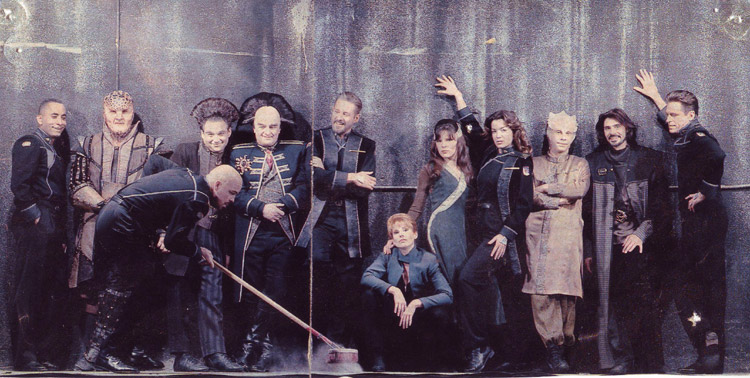
Just a few of the sprawling cast of characters:
There are many more characters, including a nice (albeit spoilery) list of villains, but hopefully this is a passable primer. Now I've spent more than enough time on the basics, and I've gone ahead and dived into "The Gathering" TV pilot movie, so in my next post I'll formally commence the rewatch analysis!

So a buddy of mine just started this 1990s cult classic for the first time. I figured it's been a while so I'd join him. And why not go full-GAF about it in the process? I figure it's a nice venue for posting thoughts as I rewatch the series, and maybe I can hook one or two new fans, or rekindle a love for the show with an old one.
What the heck is Babylon 5?
Well, firstly, let's take a look at what Wikipedia has to say.
Babylon 5 is an American science fiction television series created by writer and producer J. Michael Straczynski, under the Babylonian Productions label, in association with Straczynski's Synthetic Worlds Ltd. and Warner Bros. Domestic Television. After the successful airing of a test pilot movie on February 22, 1993, Babylon 5: The Gathering, in May 1993 Warner Brothers commissioned the series for production as part of its Prime Time Entertainment Network (PTEN).[1]
The first season premiered in the US on January 26, 1994, and the series ultimately ran for the intended five seasons. Describing it as having "always been conceived as, fundamentally, a five year story, a novel for television", Straczynski wrote 92 of the 110 episodes, and served as executive producer, along with Douglas Netter.[2]

A "novel for television" approach? In the 1990s?
Yep. Y'all have heard of Twin Peaks, right? Stupid question, it's 2017, the revival's on the air, of course you have. Babylon 5 was kind of the original Twin Peaks of space opera TV. Early on, the episodic-versus-serialized ratio is slimmer -- think X-Files standalone-versus-mythology, I guess -- but as the seasons roll by, that ratio tilts in favor of the ongoing plotlines. Of which there are several. The worldbuilding is superb, and multiple plot arcs come to a head, especially in the fourth season when original network PTEN was close to folding and JMS realized he needed to wrap things up fast. For my money, both as a wide-eyed child and a more seasoned adult, he does so with aplomb. (TNT then picked up the series for a fifth season, multiple TV movies, and an ultimately-botched spinoff called Crusade, making Season "5.0" pretty rough and episodic again before moving toward a great back half and a series finale so good AVClub wonders if it's the best in television.) Obviously, don't actually read that article if you want to remain unspoiled.

What's the pitch, in a nutshell?
Earth's still a relative newcomer to the intergalactic scene. We had ourselves a bit of a war with the Minbari, who very nearly wiped us out of existence but pulled back from the assault at the last minute for reasons unknown. In recent years, we've tried our luck at "the Babylon Project" -- a space station that'll act as neutral ground for humanity and several prominent alien races to talk things through and avoid further bloodshed. It... hasn't gone well. The first three Babylon stations were all sabotaged and destroyed. The fourth one seemingly blinked out of existence -- no one knows what the heck happened. As you might imagine, we begin our story toward the beginning days of the fifth.
At first, the show seems content to tell the story as I've just told you. But archaeological discoveries, rising tensions between races, mysterious benefactors, conspiracies back home on Earth, and characters pushed to the brink, will all come together to illustrate that the universe is much bigger than we think it is, and events are being orchestrated to throw us all into the fire.
What are the best aspects of this show?
Man, the worldbuilding is terrific. JMS tapped into certain Tolkien concepts, and it shows, but he does it with all his own flourishes and several distinctive alien races, a few of which are better-developed than most of what we see in the Star Trek franchise. (I'm a Niner 'til I drop and I <3 Cardassians and Bajorans, but seriously, the Minbari and the Centauri and the Narn on B5 are all good stuff.) The setting rocks, too. The titular station is well-realized, with neat this-isn't-quite-as-advanced-as-Trek beats like rollercoaster-looking harnesses while riding a commuter tram, and a rough-and-tumbling alien-outcasts sector reminiscent of Star Wars: Knights of the Old Republic's Taris Underdark. Best of all, though, is the successfully-told story. The narrative has some neat twists and turns along the way, including some very Mass Effect 1 moments. There's also the matter of the two alien ambassadors named Londo Mollari and G'Kar; their personal arcs are some of the best I've seen in any entertainment medium, but I'll say no more. Best to see it for yourself.

You're hyping it to hell. Is it truly perfect television?
Heavens, no. It's rough around the edges, I'm not gonna lie. It isn't my favorite show, although it's up there. The pilot TV movie and much of the first season can be a trying experience, with cheesy moments galore and some very questionable acting. Even in the second and third seasons, this doesn't entirely go away, although it gets better every year. Don't get too attached to the early cast, because several of the characters in the TV movie aren't even in the show, which premiered almost a year later. And as I've previously mentioned, the first half of Season 5 is a real step down, too, but thankfully many of the core plot arcs are resolved by that point. It's also my personal opinion that Babylon 5 standalone episodes are almost never great, and only a few of them are truly good. It's the serialized stuff you'll want to stick around for, and I've known friends who have dropped it like a hot potato because of the earlier fare. Can't blame 'em. But it's a series that rewards patience tenfold.

Just a few of the sprawling cast of characters:
- John Sheridan is a military commander with a heck of a conscience and a drive to do what's right without sacrificing what makes us great. He's one of the main characters, and arguably its principle protagonist.

- Delenn of Mir is a Minbari ambassador who knows far more than she lets on and experiences some genuine transformational moments. While her true allegiances remain shrouded in mystery early on, she seems to possess a commitment to the truth.

- Susan Ivanova is played by a woman whose voice you've probably heard if you've ever played Skyrim. In Babylon 5, she's a no-nonsense Russian rising star within the military, and a cynic through and through. She's great.

- Michael Garibaldi is the station's security chief. He's suffered from addictions in the past and retains some of that darker side of living, but he's also got a love for Looney Tunes and Italian cooking. When I was a kid, I thought he was Bruce Willis.

- Jeffrey Sinclair is the initial commander of Babylon 5. When the show begins, you'll be seeing a lot of him. As the Minbari eloquently put it, "there's a hole in your mind" -- he's missing 24 hours of memory from the climax of the Earth-Minbari War. Weird, eh?

- Londo Mollari is a member of the Centauri race and another ambassador aboard the station. The Centauri are kind of a "fallen Roman Empire" style of race, and Londo's no exception. He dreams of bygone imperial grandeur, but he's been tossed to the wolves by his superiors, sent to the dead-end job on Babylon 5.

- G'Kar is the Narn ambassador to Babylon 5, a cunning and at times downright conniving fellow with an elegant outlook on life. His journey is a sight to behold, so there's really not much I can say. Trust that he's well-acted and well-realized.

- Stephen Franklin is the Chief Medical Officer aboard the station. His commitment to the common good is unquestionable, but the realities of the world he lives in will bring him to some dark places.
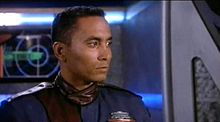
- Marcus Cole is a Ranger, and you can probably replace that word with "Night's Watchman" or replace his name with "Aragorn" and either way you'll arrive at the same conclusion. He's one of my favorites, although he's a bit of a late joiner. He knows how to hurt people with a metal stick, too.
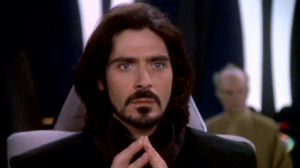
- Lyta Alexander is a telepath and a registered member of Psi Corps. EarthGov has authorized the use of telepaths in matters of business and military, but you can bet there are plenty of people out there who aren't happy about that.

- Alfred Bester is a high-ranking PsiCorp operative played by the legendary Walter Koenig. Need I say more? I probably should, actually, because the Bester character is full of so many delicious shades of grey that it's hard for me to see the actor as Pavel Chekov. Koenig himself seems to have enjoyed the role more, as he talks about it more, and for good reason.
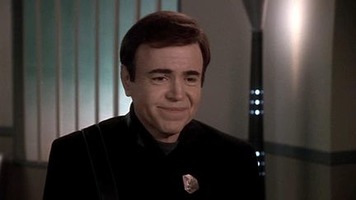
- Talia Winters is, like Lyta, a telepath and registered member of Psi Corps. She stands at-odds with Susan Ivanova, whose past has ties to the Corps. Talia doesn't necessarily agree with the way her employers handle every situation.

- Lennier comes aboard the station as a new aide to Ambassador Delenn. He has a pure heart, and a love of history. He is fascinated by other cultures, but maintains a steely resolve toward traditional Minbari practices.
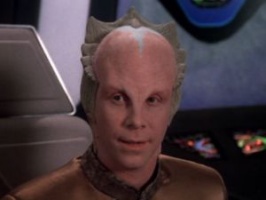
- Vir serves as aide to Ambassador Londo Mollari. While at first he seems little more than a bumbling young oaf, Vir develops into an unmistakable heart of the show as the seasons progress.

- Kosh is a mystery wrapped in enigma, and about as alien as you can get. He's the final of the five ambassadors to the station, and his people -- the Vorlons -- are key to many of the mysteries within the mythology. What you're seeing in his thumbnail isn't really him; it's a weird environmental suit, because there ain't no way the Vorlons are gonna let us see them for who they really are.

There are many more characters, including a nice (albeit spoilery) list of villains, but hopefully this is a passable primer. Now I've spent more than enough time on the basics, and I've gone ahead and dived into "The Gathering" TV pilot movie, so in my next post I'll formally commence the rewatch analysis!

